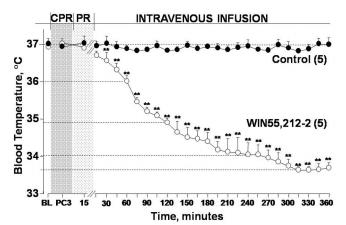Biomedical
Induced Hypothermia through WIN55, 212-2 Administration
The estimated survival rates for cardiac arrest are at or below 10%, with survivors commonly acquiring severe disabilities. Treatment during cardiac arrest consists of cardiopulmonary resuscitation and/or shock defibrillation. Recent clinical studies have shown that reducing the blood temperature from 37°C to 32-34°C can significantly increase survival rates and reduce risk of permanent brain damage. Current methods for inducing hypothermia are primarily conducted through surface temperature modification via ice water bath or through endovascular cooling. Each of these methods can take a substantial time to reach adequate temperature, and can only be conducted once in a hospital setting.
The technology
Researchers at Virginia Commonwealth University have developed a novel therapeutic that describes the use of synthetic cannabinoid Win55, 212-2 to induce hypothermia following cardiac arrest. A recent study conducted by the Weil Institute showed that in a rat model, the administration of Winn55, 212-2 led to a significant reduction of core body temperature over time with respect to the control, as shown in the figure on the right. Reduction in temperature in a more time dependent manner could lead to greater efficiency in inducing hypothermia following cardiac arrest. This could then lead to increased survival rates and reduced likelihood of severe brain trauma.
In vivo results have been positive in a rodent model

